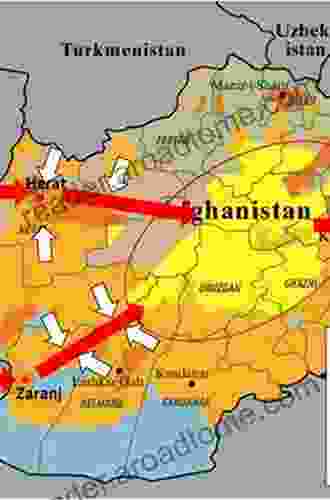Iran's Influence in Afghanistan: A Comprehensive Analysis

Iran and Afghanistan have a long and complex history, dating back to the ancient Persian Empire. In recent decades, Iran has played a significant role in Afghanistan, both as a neighbor and as a regional power. Iran's influence in Afghanistan is multifaceted, encompassing political, economic, cultural, and historical factors.
This article provides a comprehensive analysis of Iran's influence in Afghanistan. It discusses the historical, political, economic, and cultural factors that have shaped Iran's role in Afghanistan, and examines the implications of this influence for the future of the region.
5 out of 5
| Language | : | English |
| File size | : | 554 KB |
| Text-to-Speech | : | Enabled |
| Screen Reader | : | Supported |
| Enhanced typesetting | : | Enabled |
| Word Wise | : | Enabled |
| Print length | : | 72 pages |
| Lending | : | Enabled |
Historical Background
Iran and Afghanistan have a shared history dating back to the ancient Persian Empire. The Persian Empire was founded by Cyrus the Great in the 6th century BC, and it ruled over a vast territory that included present-day Iran, Afghanistan, and much of Central Asia. The Persian Empire was a major center of civilization, and its influence can still be seen in the region today.
After the fall of the Persian Empire, the region was ruled by a succession of empires, including the Seleucid Empire, the Parthian Empire, and the Sassanid Empire. In the 7th century AD, the region was conquered by the Arabs, and it became part of the Islamic Caliphate.
In the 10th century AD, the region was conquered by the Ghaznavids, a Turkic dynasty that ruled over much of Central Asia. The Ghaznavids were followed by the Seljuks, another Turkic dynasty that ruled over a vast territory that included Iran, Afghanistan, and much of Central Asia.
In the 13th century AD, the region was conquered by the Mongols. The Mongols were a nomadic people from Central Asia, and they established a vast empire that stretched from China to Europe. The Mongol Empire was a major center of trade and culture, and its influence can still be seen in the region today.
In the 14th century AD, the region was conquered by Timur, a Turco-Mongol conqueror. Timur was a ruthless leader, and he destroyed many cities and killed many people. However, he also patronized the arts and sciences, and he established a vast empire that stretched from Central Asia to India.
In the 16th century AD, the region was conquered by the Safavids, a Shia dynasty that ruled over Iran and Afghanistan. The Safavids were a powerful dynasty, and they made Shia Islam the official religion of Iran. The Safavids were followed by the Qajars, a Turkic dynasty that ruled over Iran and Afghanistan from the 18th to the 20th century.
In the 19th century AD, Afghanistan became a buffer state between the Russian Empire and the British Empire. The British Empire controlled India, and it was concerned about Russian expansion into Central Asia. The British Empire supported Afghanistan's independence, and it helped to create a buffer state between Russia and India.
In the 20th century AD, Afghanistan became a independent country. However, it was still heavily influenced by its neighbors, Iran and the Soviet Union. The Soviet Union invaded Afghanistan in 1979, and it occupied the country for ten years. The Soviet occupation ended in 1989, and Afghanistan was plunged into a civil war.
The civil war in Afghanistan lasted for several years, and it resulted in the deaths of many people. The civil war ended in 2001, when the United States invaded Afghanistan and overthrew the Taliban. The United States has been involved in Afghanistan since 2001, and it has helped to establish a new government.
Political Influence
Iran has a significant political influence in Afghanistan. This influence is due to a number of factors, including Iran's geographic proximity to Afghanistan, its shared history with Afghanistan, and its large Shia population.
Iran has been involved in Afghanistan's political affairs for many years. In the 1980s, Iran supported the Afghan mujahideen in their fight against the Soviet Union. After the Soviet Union withdrew from Afghanistan in 1989, Iran continued to support the mujahideen in their fight against the Afghan government.
In the 1990s, Iran supported the Taliban in their fight against the mujahideen. The Taliban is a Sunni Islamic fundamentalist group that ruled Afghanistan from 1996 to 2001. The Taliban was overthrown by the United States in 2001, but it has continued to fight against the Afghan government.
Iran continues to be involved in Afghanistan's political affairs. Iran supports the Afghan government, but it also has ties to the Taliban. Iran's goal is to maintain a stable and friendly government in Afghanistan.
Economic Influence
Iran has a significant economic influence in Afghanistan. Iran is Afghanistan's largest trading partner, and it provides Afghanistan with a significant amount of aid. Iran also invests in Afghanistan's infrastructure, and it has helped to build roads, railways, and power plants in Afghanistan.
Iran's economic influence in Afghanistan is due to a number of factors, including Iran's geographic proximity to Afghanistan, its shared history with Afghanistan, and its large Shia population. Iran is also a major oil producer, and it has been able to use its oil wealth to invest in Afghanistan's economy.
Iran's economic influence in Afghanistan is likely to continue to grow in the future. Iran is a major regional power, and it is well-positioned to play a leading role in Afghanistan's economic development.
Cultural Influence
Iran has a significant cultural influence in Afghanistan. This influence is due to a number of factors, including Iran's geographic proximity to Afghanistan, its shared history with Afghanistan, and its large Shia population.
Iran's cultural influence in Afghanistan is evident in a number of ways. For example, the Persian language is widely spoken in Afghanistan, and many Afghan customs and traditions are similar to Iranian customs and traditions. Iran also has a significant influence on Afghanistan's media, and many Afghan television and radio programs are produced in Iran.
Iran's cultural influence in Afghanistan is likely to continue to grow in the future. Iran is a major regional power, and it is well-positioned to play a leading role in Afghanistan's cultural development.
Future Implications
Iran's influence in Afghanistan is likely to continue to be significant in the future. Iran is a major regional power, and it is well-positioned to play a leading role in Afghanistan's development. Iran has a number of interests in Afghanistan, including
5 out of 5
| Language | : | English |
| File size | : | 554 KB |
| Text-to-Speech | : | Enabled |
| Screen Reader | : | Supported |
| Enhanced typesetting | : | Enabled |
| Word Wise | : | Enabled |
| Print length | : | 72 pages |
| Lending | : | Enabled |
Do you want to contribute by writing guest posts on this blog?
Please contact us and send us a resume of previous articles that you have written.
Light bulbAdvertise smarter! Our strategic ad space ensures maximum exposure. Reserve your spot today!

 Miguel de CervantesUnlock the Power of Your Mind: Explore the Frontiers of Brain Computer...
Miguel de CervantesUnlock the Power of Your Mind: Explore the Frontiers of Brain Computer... Devon MitchellFollow ·2.6k
Devon MitchellFollow ·2.6k Yasunari KawabataFollow ·16k
Yasunari KawabataFollow ·16k Junichiro TanizakiFollow ·15.5k
Junichiro TanizakiFollow ·15.5k Giovanni MitchellFollow ·17.6k
Giovanni MitchellFollow ·17.6k Dylan HayesFollow ·2.3k
Dylan HayesFollow ·2.3k Charles DickensFollow ·12.2k
Charles DickensFollow ·12.2k Alec HayesFollow ·18.1k
Alec HayesFollow ·18.1k T.S. EliotFollow ·5.3k
T.S. EliotFollow ·5.3k

 Brady Mitchell
Brady MitchellUnveiling the Apprehended Vital Truth for the Bride of...
In the tapestry of life, where trials and...

 Eric Nelson
Eric NelsonDivine Energy Harmony Way: Embracing the Power Within for...
In the realm of personal...

 Robert Louis Stevenson
Robert Louis StevensonUnlock the Secrets of Calf Growth and Development: A...
Are you an aspiring...

 Gerald Parker
Gerald ParkerPhysician Life In The Shadow Of Polio: A Harrowing and...
A Riveting Tale of Determination Amidst a...
5 out of 5
| Language | : | English |
| File size | : | 554 KB |
| Text-to-Speech | : | Enabled |
| Screen Reader | : | Supported |
| Enhanced typesetting | : | Enabled |
| Word Wise | : | Enabled |
| Print length | : | 72 pages |
| Lending | : | Enabled |




















































